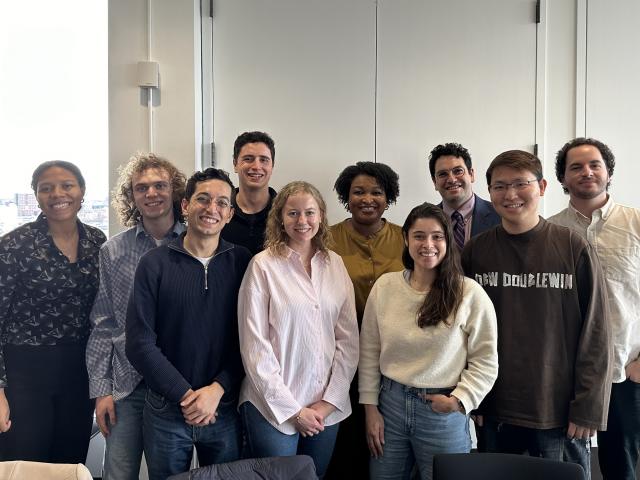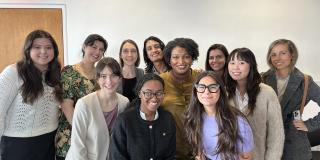
Stacey Abrams Discusses the Urgency of Digital Gender Equity

Advancing digital equity for women and girls is key to ensuring access to economic opportunity, safety and security, and democracy, Stacey Abrams told a group of students at a March 7 IGP policy roundtable on global gender issues. Abrams, who is a former Georgia House minority leader and an IGP Inaugural Carnegie Distinguished Fellow, spoke about gender and racial disparities in internet access and their impacts on securing social services, education, and healthcare during the workshop, titled “Advancing Gender Equality Worldwide.” The discussion was moderated by SIPA senior lecturer Jenny McGill, who is also co-director of SIPA’s Economic and Political Development concentration.
In the US, particularly in rural communities, lack of digital equity is a “life-or-death” issue, Abrams said, as people in need of critical medical care are unable to access telehealth services without internet. In more isolated areas, the closest hospital may be over an hour away, and locating providers that accept Medicaid can be challenging without online help. Economically, digital inequity perpetuates a cycle of poverty, Abrams explained.
“It is an economic empowerment issue for people in rural areas and people of color, because you can’t apply for a job these days without the internet,” Abrams said. “You can’t apply for resources either – resources to which you’re entitled. You can’t access any of the services that can help lift you out of poverty unless you have access to the internet.”
“If we want to lift up women and girls, if we want to lift up people of color, we have got to show, sustain, and support access to power.”
— Stacey Abrams
Abrams spoke about the transformative power digital equity holds for women around the globe.
“[F]or me, it’s a proxy conversation to talk about digital equity, but embedded in that are conversations about women’s empowerment, skills training, access to actual information about their healthcare and about how their bodies are changing,” she told the students. “It’s how you can provide information about safety and security, and democracy, and it’s also how we save ourselves from authoritarian regimes and fascism that would ever arise if we look away.”
As an example, Abrams highlighted her recent work at the Women Deliver Conference, held last July in Kigali, Rwanda. She recounted meeting with women from Burkina Faso trying to get women elected to local government, women from Gambia working to improve healthcare and the maternal mortality rate, women from Kenya focused on environmental action, and women from Bhutan fighting to increase awareness of the oppression in their country.

“What was so remarkable though was that these were women who were spending every day of their lives trying to save other women, and that in that space of 6,300 participants, they found kindred spirits and they also found ideas,” Abrams said. “No matter which language we spoke, no matter where we were from, the common creative core was that if we could, here’s what we would be.”
A major problem, said Abrams, is women and people of color “simply not knowing where the door is.” She has made it her mission to figure out where power is, find the door, and make sure others gain access, whether it is to high-speed internet or to education.
“If we want to lift up women and girls, if we want to lift up people of color, we have got to show, sustain, and support access to power,” she said. “You are all here because you understand the power of education. It’s the truest transport and truest passport to opportunity.”
As part of her IGP residency, Abrams will be working with SIPA faculty and IGP Student Scholars on two digital equity projects — one that examines the rural/urban digital equity in Georgia and the other that examines the digital gender gap in Kenya.